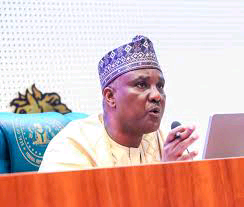-
House Speaker raises alarm as debt breaches legal threshold with GDP ratio at 52 percent.
-
Abbas insists loans must fund infrastructure, jobs, health, and education, not corruption.
-
Africa-wide debt crisis shows governments spending more on repayments than development.
Hon. Tajudeen Abbas, Speaker of the House of Representatives, cautioned as Nigeria’s debt burden surged to an unprecedented ₦149.39 trillion.
He warned that the country is on the brink of mortgaging its future if reckless borrowing persists.
ATTENTION: Click “HERE” to join our WhatsApp group and receive News updates directly on your WhatsApp!
Represented by House Majority Leader, Hon Julius Ihonvbere, Abbas spoke at the opening of the West Africa Association of Public Accounts Committees (WAAPAC) annual conference in Abuja, where he revealed that the nation’s debt-to-GDP ratio has soared to 52 percent, far above the legal 40 percent ceiling.
The Speaker stressed that Nigeria’s domestic loans now constitute 53 percent of the debt stock, while external borrowings account for 47 percent.
He warned that such a balance, coupled with the breach of statutory limits, signals a dangerous erosion of fiscal sustainability and puts future generations at risk.
READ ALSO: Gabon’s Atcho Leads Officials for Nigeria vs South Africa
Nigeria’s sharp rise in public debt from ₦121.7 trillion in 2024 to ₦149.39 trillion in the first quarter of 2025 underscores a trajectory that economists say could cripple economic stability.
Abbas urged for transparent borrowing practices and stronger parliamentary oversight to ensure every naira borrowed is tied to visible development outcomes.
At the continental level, Abbas observed that Africa faces a structural debt crisis, with nations like Sudan (344%), Angola (136.8%), Ghana (84%), Kenya (70%) and South Africa (77%) all recording alarming debt-to-GDP ratios.
He lamented that most African governments now spend more on debt servicing than on healthcare and education, leaving little fiscal space for development.
The Speaker insisted that loans must be channelled strictly into infrastructure, education, industries, and health projects that create jobs, rather than being wasted on recurrent expenses or lost to corruption.
He warned that Africa’s dependence on western private lenders, multilateral institutions, and high-interest commercial loans leaves economies vulnerable to global shocks.
Abbas called on parliaments across West Africa to strengthen their finance and public accounts committees, hold public hearings on major borrowing plans, and publish simplified debt reports that allow citizens to track fiscal accountability.
He pledged that Nigeria’s legislature would lead by example in ensuring transparency and fairness in debt management.


